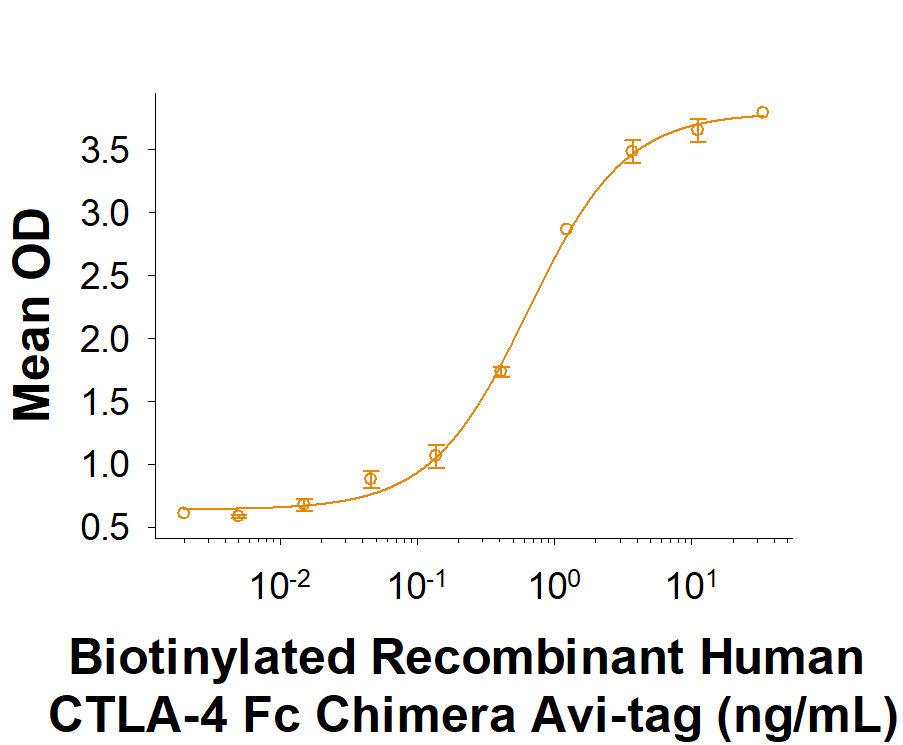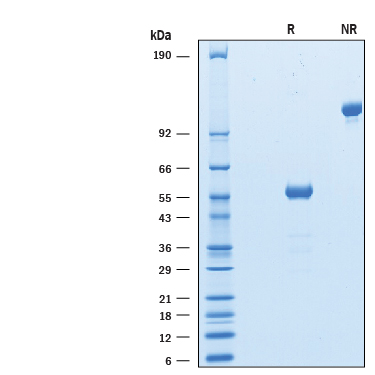Recombinant Human CTLA-4 Fc Chimera Avi-tag Protein, CF
Recombinant Human CTLA-4 Fc Chimera Avi-tag Protein, CF Summary
Learn more about Avi-tag Biotinylated ProteinsWhy choose R&D Systems Avi-tag CTLA-4 Protein?
- Guaranteed Bioactivity and High Purity: Bioactivity tested by functional ELISA and purity determined by SDS-PAGE to be greater than 95%.
- Lot-to-Lot Consistency: Stringent QC testing performed on each lot to ensure consistent activity and purity.
- Bulk Quantities Available: Bulk up and save with large mass quantities to meet your research needs. Supply agreements available, partner with us. Please contact us.
- Most Respected, Most Cited Brand in Proteins: With over 35 years of providing the best recombinant proteins to the scientific community, R&D Systems continues to lead the industry in quality, activity, and purity.
Product Specifications
| Human CTLA-4 (Ala37-Phe162) Accession # P16410.3 | IEGRMD | Human IgG1 (Pro100-Lys330) | Avi-tag |
| N-terminus | C-terminus | ||
Analysis
Product Datasheets
Carrier Free
CF stands for Carrier Free (CF). We typically add Bovine Serum Albumin (BSA) as a carrier protein to our recombinant proteins. Adding a carrier protein enhances protein stability, increases shelf-life, and allows the recombinant protein to be stored at a more dilute concentration. The carrier free version does not contain BSA.
In general, we advise purchasing the recombinant protein with BSA for use in cell or tissue culture, or as an ELISA standard. In contrast, the carrier free protein is recommended for applications, in which the presence of BSA could interfere.
AVI7268
| Formulation | Lyophilized from a 0.2 μm filtered solution in PBS with Trehalose. |
| Reconstitution | Reconstitute at 500 μg/mL in PBS. |
| Shipping | The product is shipped at ambient temperature. Upon receipt, store it immediately at the temperature recommended below. |
| Stability & Storage: | Use a manual defrost freezer and avoid repeated freeze-thaw cycles.
|
Scientific Data
 View Larger
View Larger
When Recombinant Human B7-1/CD80 Fc Chimera (Catalog # 10133-B1) is immobilized at 0.5 µg/mL, Biotinylated Recombinant Human CTLA-4 Fc Chimera Avi-tag (Catalog # AVI7268) binds with an ED50 of 0.4-2.4 ng/mL.
 View Larger
View Larger
2 μg/lane of Biotinylated Recombinant Human CTLA-4 Fc Chimera Avi-tag (Catalog # AVI7268) was resolved with SDS-PAGE under reducing (R) and non-reducing (NR) conditions and visualized by Coomassie® Blue staining, showing bands at 53-61 kDa and 110-120 kDa, respectively.
Reconstitution Calculator
Background: CTLA-4
CTLA-4 (cytotoxic T-lymphocyte associated protein‑4, designated CD152), is a type I transmembrane T cell inhibitory molecule that is a member of the Ig superfamily (1, 2). Human or mouse CTLA-4 cDNA encodes 223 amino acids (aa) including a 35 aa signal sequence, a 126 aa extracellular domain (ECD) with one Ig-like V-type domain, a 21 aa transmembrane (TM) sequence, and a 41 aa cytoplasmic sequence. It is found as a covalent homodimer of 41-43 kDa (2) Within the ECD, human CTLA-4 shares 68%, 71% and 83‑86% aa sequence identity with mouse, rat and porcine/bovine/rabbit/feline/canine CTLA-4, respectively. A 174 aa form that lacks TM and cytoplasmic sequences (sCTLA-4) is possibly secreted (3-5). Isoforms of 56-79 aa that mainly contain parts of the cytoplasmic domain are reported. In mouse, an isoform lacking the Ig-like domain has ligand-independent inhibitory activity and is termed liCTLA-4 (6). CD28, which is structurally related to CTLA-4, is constitutively expressed on naïve T cells and promotes T cell activation when engaged by B7-2 on antigen-presenting cells (APC) within the immunological synapse (IS) (1, 7, 8). In contrast, CTLA-4 is recruited from intracellular vesicles to the IS beginning 1-2 days after T cell activation (2, 7, 8). It forms a linear lattice with B7-1 on APC, inducing negative regulatory signals and ending T cell activation (9). Abatacept, a therapeutic human CTLA-4-Ig fusion protein (trade name Orencia), competes with CD28 for B7-1 and B7-2 binding and has been used to antagonize T cell activation in autoimmune conditions and to enhance transplant survival (10). Mice deleted for CTLA-4 show no abnormalities until after birth, but then develop lethal autoimmune reactions due to continued T cell activation and poor control by regulatory T cells, which constitutively express CTLA-4 in wild-type mice and humans (11-13).
- Harper, K. et al. (1991) J. Immunol. 147:1037.
- Teft, W.A. et al. (2006) Annu. Rev. Immunol. 24:65.
- Magistrelli, G. et al. (1999) Eur. J. Immunol. 29:3596.
- Tector, M. et al. (2009) BMC Immunol. 10:51.
- Oaks, M.K. and K.M. Hallett (2000) J. Immunol. 164:5015.
- Vijayakrishnan, L. et al. (2004) Immunity 20:563.
- Pentcheva-Hoang, T. et al. (2004) Immunity 21:401.
- Jansson, A. et al. (2005) J. Immunol 175:1575.
- Darlington, P.J. et al. (2005) J. Immunol. 175:996.
- Platt, A.M. et al. (2010) J. Immunol. 185:1558.
- Wing, K. et al. (2008) Science 322:271.
- Friedline, R.H. et al. (2009) J. Exp. Med. 206:421.
- Jain, N. et al. (2010) Proc. Natl. Acad. Sci. USA 107:1524.
FAQs
No product specific FAQs exist for this product, however you may
View all Proteins and Enzyme FAQsReviews for Recombinant Human CTLA-4 Fc Chimera Avi-tag Protein, CF
There are currently no reviews for this product. Be the first to review Recombinant Human CTLA-4 Fc Chimera Avi-tag Protein, CF and earn rewards!
Have you used Recombinant Human CTLA-4 Fc Chimera Avi-tag Protein, CF?
Submit a review and receive an Amazon gift card.
$25/€18/£15/$25CAN/¥75 Yuan/¥2500 Yen for a review with an image
$10/€7/£6/$10 CAD/¥70 Yuan/¥1110 Yen for a review without an image
